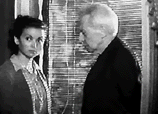Umberto Domenico Ferrari (Carlo Battisti) is a proud, retired civil servant struggling to eke out a meager existence on his government pension. The film opens one morning to a group of pensioners, including the frail Umberto, taking their case for equitable compensation to the streets of Rome, only for their demonstration to be quashed by the local police for failing to file a permit. Umberto’s rent is in arrears, and despite his twenty year residence at the house, his landlady (Lina Gennari) has threatened to evict him if he is unable to settle his debt by the end of the month. His only sources of comfort are his faithful and well-behaved dog, Flag, and the landlady’s cheerful, attentive maid, Maria (Maria-Pia Casilio), who is equally in danger of losing her employment and lodging after discovering that she is pregnant. In order to raise a portion of the rent money as a sign of good faith until his pension arrives, he visits a cafeteria and passes his pocket watch around the table to other diners in an attempt to find a buyer. He ventures out in the evening in ill health to sell his cherished books to a street merchant. He visits old friends in an attempt to gain sympathy and request a loan. Yet, despite his exhaustive efforts, the landlady is unwilling to accept partial payment, and Umberto is faced with the agonizing decision to humble himself, or to accept the unthinkable prospect of losing his home.
Vittorio de Sica presents an honest, unsentimental, and profoundly moving portrait on aging, dignity, and resilience in Umberto D. Through the recurring imagery of motion and activity, De Sica contrasts Umberto’s age and wavering sense of purpose with the vitality of hope and the process of living: the pensioner demonstration; the hurried pace of commuters; the passing of cable cars; the children playing. Note that Umberto’s sense of despair is often juxtaposed against the passing of a moving vehicle. The final scene shows Umberto playing with Flag at a public park. It is a subtle affirmation of the daily ritual of life – a quiet celebration of the often insignificant moments of joy and distraction that redeem human existence.
© Acquarello 2001. All rights reserved.
